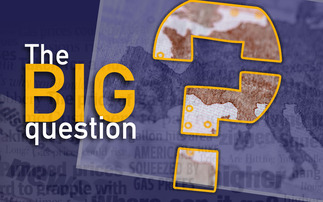The UK could find itself stuck in Brussels for years with the Department for Brexit, involved in a negotiation about the right to negotiate, warns former Greek finance minister Yanis Varoufakis.
Europe performed better last year than expected, so it is very easy to start thinking it may be a source of good news for 2017-18 - but some caution is advised before you come to this conclusion
Take Italy. It is too large to bail out, too large to ignore and too large to be bullied the way Greece was bullied. Italy is about to enter its perfect storm.
So far, European Central Bank (ECB) President Mario Draghi has purchased €210bn (£176bn) worth of Italian government bonds. In the next period, Italy will have to roll over €1trn, at a time when Draghi is being forced to taper.
Note 'forced' - he is not choosing to taper. Why? Because of a shortage of German bunds. Remember how European quantitative easing (QE) works: to buy any amount of Italian bonds, Draghi has to buy twice as many bunds. That is the only way the ECB could pull off QE 'euro-style'.
Yanis Varoufakis: Why we should all be wary of the euro
In other words, the only way of convincing German Chancellor Angela Merkel and Bundesbank chairman Jens Weidmann to allow the ECB to do QE was that it purchased government debt in proportion to GDP or to ECB shareholding by member states. Same thing.
Now, the problem is that bunds are running out because German finance minister Dr Wolfgang Schäuble is not issuing them - he is running a surplus. German financial institutions have an obligation to retain the bunds they have. So you have excess demand for bunds.
This is creating problems for the smaller banks in Germany and the pension funds. And that is pushing Draghi into tapering already, and why the ECB's programme of QE is going to be withdrawn very soon.
It comes at a time when Italy has to refinance about €1trn. It comes at a time when the Italian banks are being forced by the Single Supervisory Mechanism (SSM), to ditch €150bn of Italian government bonds, because of their overdependence - or actually the overdependence of the Italian state on Italian banks.
And it comes at a time of US monetary tightening that is only likely to become tighter over the next 12 months.
My great worry about President Donald Trump is that he means what he says. And what does he say? That he is going to pump up infrastructure spending. This is going to do two things at the same time.
On the one hand, it is going to increase substantially the supply of treasuries - in the US markets and in the global markets - while the trade war, or the squeeze on China by the new administration, is very likely to initiate a sell-off of treasuries there and other kinds of pressures as the credit bubble in China begins to subside.
In this context, the problem Italy poses for the ECB and the eurozone, in combination with Trump's clear and present danger in relation to the Chinese credit bubble, creates the possibility of the further destabilisation of the European Union (EU) and European monetary union.













